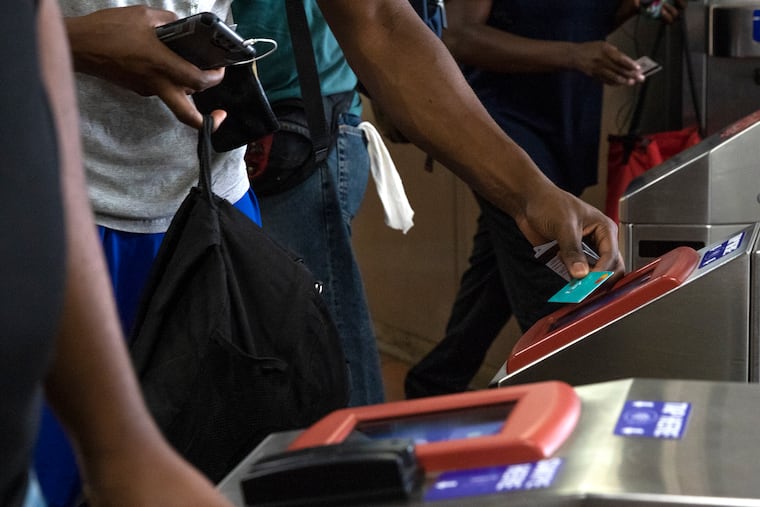SEPTA is investigating claims of fraudulent charges for poor using new fare card
SEPTA is looking into how its fare card might allow people to take advantage of the poor.

SEPTA is using undercover personnel to investigate claims that retailers selling the transit agency's new smart fare card are overcharging customers for transactions on those cards.
The transit agency heard complaints at its September board meeting that some retailers were wrongly charging customers $2 to $4 to add money to their card balance, particularly when the customer paid in cash. SEPTA's agreement with the 533 retailers authorized to handle transactions on the new Key cards does not permit them to profit from those exchanges.
It's the same agreement retailers who used to sell tokens made, said Andrew Busch, a SEPTA spokesperson. The businesses agree to sell and service the fare cards without a markup, and in exchange, ideally, get an increase in foot traffic.
Personnel from SEPTA and Conduent, the company that installed and maintains the Key card system, have been doing checks at businesses authorized to sell the card, but that effort is increasing due to the recent complaints, Busch said.
>>READ MORE: SEPTA's digital fare card hurts the city's poor, advocate says
"We'll send people into the stores to try to make sure they're complying with it correctly," he said. "It may take the form of someone going in to make a purchase and seeing what happens."
So far, SEPTA isn't saying what, if anything, it has learned about overcharging; Busch said more information was needed.
The possibility of cash-paying customers being overcharged represents one of a number of ways the SEPTA Key might make transit more costly for the poor, said Lance Haver, policy director of Pennsylvania Save Our Safety Net Coalition, a group that advocates for government social services.
"SEPTA has a responsibility to represent everyone," Haver said. "What I'm saying is they're failing to do that. They're only representing middle-class and upper-middle-class riders."
About 42 percent of SEPTA riders make less than $35,000 a year, the agency confirmed, and SEPTA is working to make the new fare system accessible, officials said.
Haver has heard from about a half-dozen people who reported being overcharged when using cash to load a Key card. The added expense could be simply an error, he said, but also could indicate predatory practices by unscrupulous businesses.
SEPTA Key is, after years of delays, taking hold as the transit fare in the region. Almost a million cards have been sold, and about 80 percent of city transit fares are now paid with them. A rollout on Regional Rail is inching forward. The card's features work best if cardholders register online and link to a credit card or bank account for automatic draws to replenish the card. That's a problem for people who don't have digital accounts or internet access.
About 12 percent of American households earning less than $40,000 are unbanked, according to the Federal Reserve, and without a link to a bank account, Key presents a host of challenges. Among them is getting to one of the kiosks, mostly located at subway stops, that sell the cards and allow riders to load them using cash. Riders who primarily use buses may have no reason to travel near the Market-Frankford or Broad Street lines, and because the card readers on vehicles don't list a card's balance, they can find themselves unable to pay bus fare and nowhere near a place where they can add to a card with cash.
>>READ MORE: SEPTA's new fare card expands to more Regional Rail stops
Claudia Schneider, 64, of South Philadelphia, who doesn't have internet access and doesn't want to share her bank information with SEPTA, faced this issue when she tried to load her card at an Acme, where she used to buy tokens for bus rides. The Acme is not on SEPTA's network of authorized card retailers, but when Schneider visited a few weeks ago, a clerk mistakenly tried to help her, she said, and told her the transaction would include a $4 service charge. She declined to pay the fee but then was left with nowhere close to her where she could add money to her card.
"Their process has not considered the ramifications to people in my circumstances," she said.
This presents a quandary for SEPTA, officials said, which is trying to ensure the fare card is easy to access by increasing the number of retailers that sell the card to 1,500. It's loath to lose any of the already authorized businesses. Riders can learn where the cards are sold through SEPTA's website.
"We don't want to shrink the number of places we do have available," Busch said. "We do want to make sure they are complying with the policy."
Haver is calling for a more comprehensive review from SEPTA to evaluate how the Key card is affecting poorer riders. SEPTA officials are talking with Haver but so far have not agreed to form a committee to review the issue.
Haver said he was concerned that the pursuit of new technology was causing the transit agency to neglect its core riders.
"When we make these major changes, we have to look at who gets left behind," Haver said, "especially if it's an organization like SEPTA that services a very significant working poor population."
Philadelphia Media Network is one of 21 news organizations producing Broke in Philly, a collaborative reporting project on solutions to poverty and the city's push toward economic justice. See all of our reporting at https://brokeinphilly.org